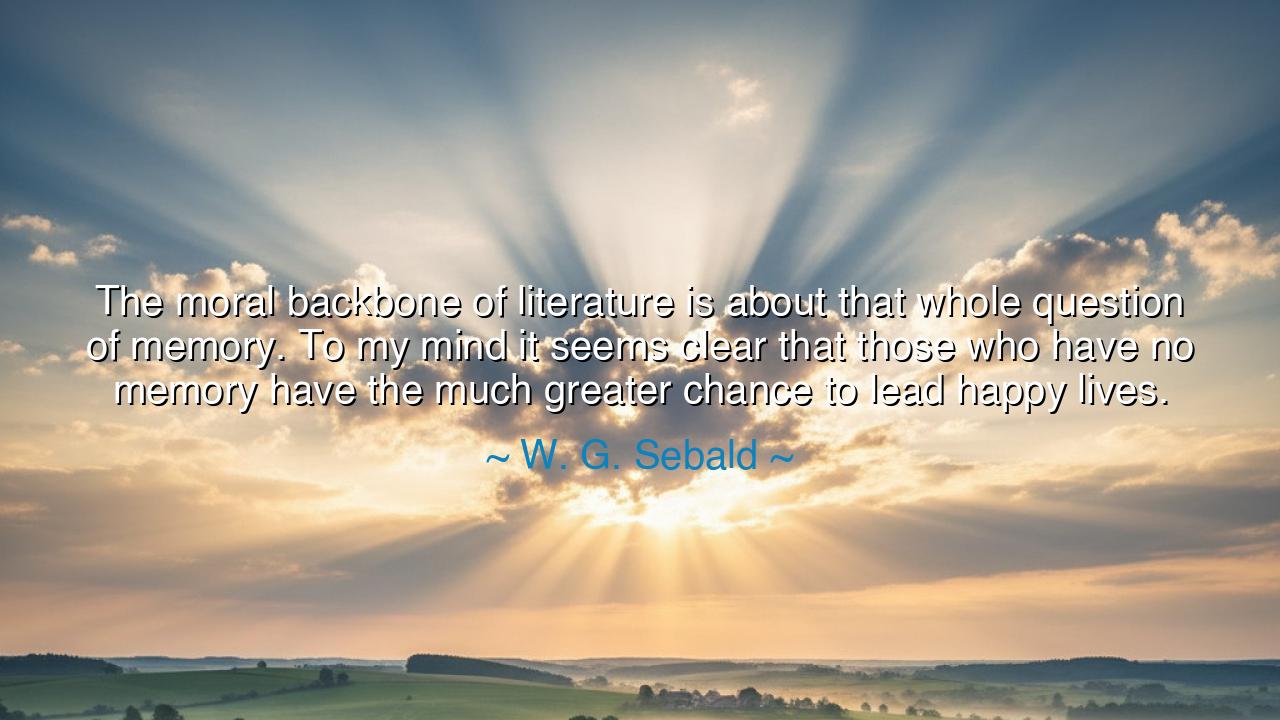
The moral backbone of literature is about that whole question of
The moral backbone of literature is about that whole question of memory. To my mind it seems clear that those who have no memory have the much greater chance to lead happy lives.






In the thoughtful words of W. G. Sebald, "The moral backbone of literature is about that whole question of memory. To my mind it seems clear that those who have no memory have the much greater chance to lead happy lives," we are confronted with the complex relationship between memory, suffering, and happiness. Sebald, a writer whose works delve into the depths of history, loss, and trauma, suggests that memory—that which we carry from the past—can often weigh heavily on our spirits. It is in the recollection of painful events and traumas that much of human suffering originates, for memory holds within it the echoes of what has been lost, what has been endured, and what has caused us harm. In this sense, Sebald’s reflection challenges the assumption that the preservation of memory is inherently virtuous or necessary for a fulfilling life. Rather, it suggests that sometimes, to live with lightness, one must let go of the burden of memory.
This understanding of memory and its influence on human life can be traced to the teachings of ancient philosophers such as Epicurus, who emphasized the pursuit of pleasure and the avoidance of pain as the ultimate goal of life. Epicurus taught that true happiness could only be found in the absence of mental suffering, which often arises from the recollection of past traumas or the anticipation of future pain. His philosophy suggests that forgetting or releasing the grip of painful memories allows us to live with freedom and peace. In much the same way, Sebald implies that those who are unburdened by the heavy chains of memory have the ability to experience life with a kind of innocence and joy that those of us who remember cannot always attain.
The connection between memory and happiness is not just theoretical, but can be seen in the lives of those who have endured great suffering. Consider the ancient story of Odysseus, the hero of Homer’s Odyssey, who is burdened by the memories of his long, arduous journey home. His tale is one of hardship, loss, and the longing for home and family. Yet, despite his eventual return to Ithaca, Odysseus cannot completely escape the shadows of his past. His memories of war, of separation from his loved ones, and the trials he faces, continue to shape his life even when he seeks peace. This conflict between past memory and present happiness is a theme that runs throughout the epic. It reveals the difficulty of finding true peace when the mind is constantly drawn back to the suffering of the past. In this way, Odysseus’ struggles mirror Sebald’s notion that forgetting or transcending painful memories can lead to a more fulfilled and joyous existence.
In modern times, the story of Viktor Frankl, a Holocaust survivor and psychiatrist, offers another example of the complex relationship between memory and happiness. Frankl, despite the harrowing memories of his time in concentration camps, found a way to transcend his suffering by focusing on the meaning of life, rather than on the pain he had endured. He famously said, "When we are no longer able to change a situation, we are challenged to change ourselves." Frankl’s life demonstrates the possibility of finding peace and happiness even in the face of unspeakable memory, suggesting that while we cannot always escape the past, we can change our relationship with it. His message is one of transcendence—the ability to find joy even when memory brings forth pain.
Yet, Sebald’s words do not solely imply that forgetting is the only path to happiness. Rather, they reflect the delicate balance between memory and mindfulness. While the past may be unavoidable, the present moment—free from the burden of constant recollection—offers us a chance to experience contentment. The Buddha taught that suffering arises from attachment, including attachment to the past. By releasing these attachments, one can achieve peace. Sebald seems to be urging us to question the weight we place on our memories and to understand that there is freedom in the ability to let go of what no longer serves us. It is not about erasing memory, but about learning to live with it in a way that does not dominate our emotional landscape.
From these teachings, we learn that while memory shapes us and is a necessary part of our identity, it is not our memory itself, but how we choose to engage with it, that determines our happiness. Like the ancient philosophers and modern figures such as Frankl, we are tasked with learning how to live with memory without allowing it to control us. Acceptance of the past, while releasing its painful hold, is key to living a life of balance and peace. This requires mindfulness—a conscious effort to focus on the present, appreciating what is before us rather than what has been lost.
The lesson, then, is clear: we must acknowledge the power of memory while also recognizing its limitations. We cannot control the memories that come to us, but we can control how much power we allow them to have over our lives. By embracing the present moment, focusing on what we can change, and releasing the heavy burden of past traumas, we allow ourselves to find the freedom that leads to happiness. Just as Sebald reflects, those who learn to balance their memories with an open heart to the present can lead lives of fulfillment, free from the shackles of unnecessary suffering.






AAdministratorAdministrator
Welcome, honored guests. Please leave a comment, we will respond soon